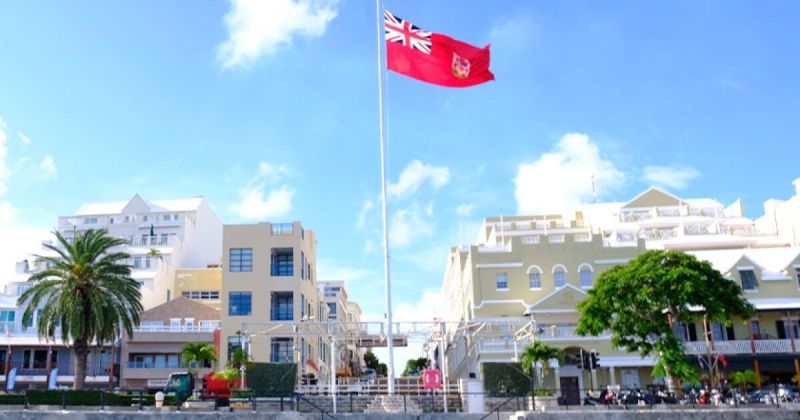
This Specialty Insurance Provider Is Crushing Its Turnaround Plan
Bermuda’s Wild West Atmosphere Has Offered A Fresh Start For P&C Insurers
| This is Porter & Co.’s The Big Secret On Wall Street, our flagship publication that we publish every Thursday at 4 pm ET. Once a month, we provide to our paid-up subscribers a full report on a stock recommendation, and also a monthly extensive review of the current portfolio… At the end of this week’s issue, paid-up subscribers can find our Top 3 “Best Buys,” three current portfolio picks that are at an attractive buy price. You can go here to see the full portfolio of The Big Secret. Every week in The Big Secret, we provide analysis for non-paid subscribers. If you’re not yet a paid subscriber, to access the full paid issue, the portfolio, and all of our Big Secret insights and recommendations, please click here. |
Alice Feller was left holding a shoe – still warm, still tied.
It was all she had left of her husband, Abe, who’d just hurled himself out the window of their 12th-story New York City apartment.
It was 1952, the height of McCarthyism, America’s “witch hunt” for Communists lurking in government and entertainment. The movement bore Senator Joe McCarthy’s name, but it ran on the manic energy of former sheep farmer, Senator Pat McCarran, described by Abe Feller’s nephew as “a silver-pompadoured scourge of the welfare state.”
Senator McCarran was a jingoist and a hard-line far-righter from Nevada, with plenty of ideas that would fit right into the more inflammatory corners of X today. These included requiring Communists to register with the government, revoking their passports, throwing them into concentration camps, blackmailing homosexuals who held government positions, and deporting anyone with “un-American” political views – all wrapped up in a deep hatred for Franklin Roosevelt’s “New Deal” and a die-hard commitment to state’s rights.
His busy schedule also included hounding Abe Feller to death.
Feller was a prime target for McCarran’s ire – a New Deal-era politician who’d served as a legal counsel for the United Nations and who had just written a left-leaning book called United Nations And World Community. McCarran had a particular bee in his bonnet about the UN, which he believed to be full of “Communists and subversive activities.” (For the record, he was not wrong.)
After a month-long interrogation by McCarran’s Senate Internal Security Subcommittee, Feller wasn’t himself. The afternoon before his death, he’d absentmindedly… or, perhaps, not?… walked into traffic. His wife dragged him out of harm’s way.
Later – in their apartment overlooking Central Park – his agitation grew worse. As Alice later told reporters:
He began talking about suicide. He said, ‘I’m going to commit suicide.’ I couldn’t believe he was serious, but I clung to him… He started back through the apartment, and I followed him as swiftly as I could through all the rooms until we came to the den off the kitchen at the rear. I would try to hold him by the arm, or by the head or the body or by the leg.”
Eventually, she was left with only a shoe, as Abe plunged to his death on the street below… taking whatever he knew about Communist activities at the United Nations with him.
McCarran had little sympathy for Feller or his dramatic leap. In a “Let them eat cake” moment after the suicide, he observed:
If Feller’s conscience was clear, he had no reason to suffer from what he expected from our committee.”
Like many folks who are perennially suspicious of government, McCarran (pictured below in his U.S. Senate office in 1949) went into government to save it from itself. Whether he succeeded is debatable, but he did manage to drive at least one man out of a skyscraper window and, eventually, trigger the devastating 1980s insurance crisis.

A Long, Sad Tail
Ironically for a man who spent much of his life ridiculing others for being too soft, Pat McCarran spent his final years suffering from a painful ulcer and being spoon-fed baby food.
Before the jars of Gerber’s, though, came the McCarran-Ferguson Act.
Like all the legislation McCarran proposed, this 1945 law bore his unmistakable far-right stamp. Its goal was to get the federal government the hell out of the insurance business.
To that end, the McCarran-Ferguson Act lodged regulatory power over insurance companies firmly with the states, and it exempted large swaths of the insurance business from antitrust law. In part, it stated:
…no Act of Congress shall be construed to invalidate, impair, or supersede any law enacted by any state for the purpose of regulating the business of insurance.”
This opened a wide loophole for insurance companies to cooperate with each other to set prices – in a way that would normally be frowned on by federal trust-busters.
This was all well and good, until – in the mid-1980s, long after McCarran had outed his last Communist – a group of American insurance companies (including Allstate, Cigna, and Aetna) colluded with Lloyd’s of London to jack up the premiums on general liability insurance.
Many insurance firms (like Lloyd’s) had unwisely written too-vague, too-generous policies on asbestos-ridden buildings, and now owed billions of dollars to folks with lung cancer as those sweeping policies – known as long-tail insurance – came due. Long-tail insurance, while popular with consumers, was costing the issuing companies way too much in damages – so the idea was to price it out of business. After all, Cigna and others reasoned, McCarran-Ferguson explicitly allowed cartel behavior in the insurance business – and they were right.
McCarran’s price-fixing loophole worked – a little too well…
Between 1984 and 1986, premium volume (the amount charged for premiums) for general liability insurance skyrocketed 70%, with costs for some types of insurance ballooning by hundreds of percent. (It didn’t help that this all occurred during a particularly “hard” part of the insurance cycle, when prices are prone to rise anyway.)
Faced with astronomically expensive insurance, many facilities – including day-care centers, doctors’ offices, and municipal buildings – simply shut down and stopped buying insurance. Between 1984 and 1985, the worst of the crisis, the property & casualty (P&C) insurance industry sustained $46 billion in underwriting losses – over half of its existing float, the premiums it collects and holds to cover any future claims.
In a way, you could say the business had taken a headlong, 12-story fall.
Bermuda Triage
Bob Clements, the head of Marsh & McLennan Insurance, was on a plane to Paris in 1984 when he figured out how to save the American insurance industry: Take it on a tropical vacation.
Much like Delaware – the convenient, loosely-regulated home of record for many American corporations – Bermuda became a handy offshore parking spot for businesses seeking to escape red tape in the U.S.
Crucially, Clements thought, the Wild West atmosphere of Bermuda offered a fresh start for P&C: a place to launch new types of policies less prone to systemic failure. And – with half the insurance business out of business due to the cartel’s price-fixing shenanigans – there was no better time to break into the industry.

Clements’ first Bermudian insurance venture, ACE Ltd. – backed by 34 corporate shareholders, including his company, Marsh & McLennan (MMC), and JPMorgan Chase (JPM) – offered a safeguard against the long-tail policies that nearly sank Lloyd’s of London. ACE’s policies put an up-front time limit on when claimants could collect damages, rather than allowing them to cash in decades later when they found holes in their lungs.
ACE – along with Clements, who became known as the “Founding Father of Bermuda Insurance” – flourished in the tropics, eventually becoming the $115 billion giant Chubb (CB). (You’ll find Chubb in the “Property & Casualty Insurance” section The Big Secret On Wall Street portfolio, up 55% since we recommended it two years ago.)
Before long, a whole flock of other insurance businesses had flown in to roost on the islands, following Clements’ model – and the success of those businesses was at least partially responsible for pulling American insurance out of its slump over the next few years. Today, Bermuda-based insurance companies serve over 150 countries, with over $128 billion of premiums written yearly; Bermuda reinsurers (insurers for insurers) comprise fully 36% of the global reinsurance business.
It’s one of those Bermuda-based businesses that we are recommending in this issue.
It began 25 years ago as a mainstream P&C insurer with a goal to fill a significant industry void, and it later was forced to adapt and ultimately found its niche as a more value-added provider of specialty services. This journey is just beginning, though.
A Commodity Player That Evolved Into A Specialty Juggernaut
This content is only available for paid members.
If you are interested in joining Porter & Co. either click the button below now or call our Customer Care team at 888-610-8895.